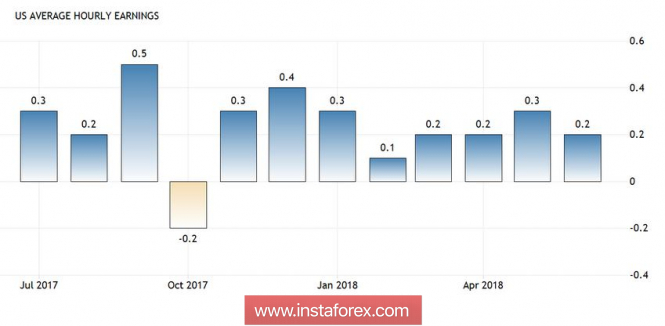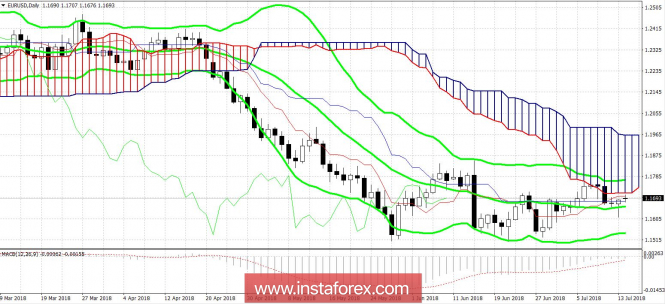This week, the euro/dollar pair will focus more on verbal intervention by politicians and central bank officials than on macroeconomic statistics. The key economic indicators affecting the dynamics of the pair were published over the past two or three weeks. Non Farms, inflation indicators of the US and Europe, production indices and GDP for the second quarter caused the market to received a fairly complete picture in order to assess the prospects for monetary policy of both the ECB and the Fed. Now, the word depends on the representatives of regulators.
Also this week, we are waiting for a quite interesting and largely determining event. The Chairman of the Federal Reserve Jerome Powell will deliver a semi-annual report on economics and monetary policy for two days in the House of Representatives of the Congress. This event traditionally causes increased volatility in the market, and will certainly cause increased interest of traders due to the current conditions. Too many questions have accumulated to Powell in the light of recent events. First of all, his assessment for inflationary growth seems interesting. In his previous speeches, he quite positively assessed the US economic growth including inflation, and he said, "slowly but surely" goes to the target level of the Fed.
But the minutes of the last meeting showed that not all members of the Federal Reserve are confident that the key indicator demonstrates stable dynamics. The consumer price index in June grew by only 0.1% (on a monthly basis), and the growth rate of the average hourly wage after an increase of 0.3% in May last month returned to its "habitual" level of 0.2%. Such inexpressive figures with a steady increase in the number of employed - not quite a good combination. The general picture is also spoiled by unemployment, which unexpectedly increased to 4% (although this indicator still remains at a record low mark).

In other words, the inflation dynamics remains ambiguous and Powell's position in this regard will play an important role. He can ignore indirect alarm signals and express confidence that inflation is systematically approaching the target level, or still focus on the weak growth of wages, voicing concerns about this fact. The dollar's reaction will depending on the tone of his speech.
The US foreign trade policy will also likely become the subject of discussion in the Senate. Not so long ago, the head of the Federal Reserve criticized the latest trends in this area. In his opinion, if high duties will be in effect for a long time, this will negatively affect the American economy. Taking into account the repeatedly voiced position of Trump (especially regarding the PRC), Powell's opinion on this issue has hardly changed.
That is, the market will assess the speech "tone" of the Federal Reserve Chair, while assessing also the possibility of the fourth rate hike in December. The confidence for the rate of the third time this year is expected to increase during the September meeting, and certainly will continue. But if the Powell report is too "dovish", the dollar will be under considerable pressure, since the probability of a fourth rate hike is projected to decrease. It is also worth noting that the documented speech of the Federal Reserve head can be published in advance, so do not be surprised if the market reacts to this report even before it is announced in the Senate.
However, the EUR/USD traders of will react this week not only to the speech of Jerome Powell, since the center of attention remains on Donald Trump due to the context of his trade confrontation with China as well as with the whole world. Yesterday, in an interview with an American television channel, Trump said that the EU and the PRC are "enemies of the United States." And if the EU treat this status "only on several aspects," then China is an economic enemy number 1, according to Trump. The market is gradually getting used to similar statements by the US president (imagine the reaction of traders if Obama had said such words a few years ago), but the stated position shows that it is still too far before the end of the trade war. Last week, the market hopes for a possible "truce" because of Beijing's restrained response to new duties from Washington.
By the way, the market will be able to assess the reaction of the financial world to the actions of the White House at the end of this week. The problem is that there will be a meeting of financial departments heads of the G20 countries schedule on July 19 to 22 in Buenos Aires. According to rumors, representatives of the EU countries will offer their colleagues to consider the draft reform of the World Trade Organization. The details of this project are still unknown, as well as the preliminary reaction of the leading countries of the world. But with a high degree of probability, it can be assumed that not only proposals for reforming the WTO will be heard at this meeting. The speeches of the representatives from the US, EU and China will make it possible to understand what steps these countries are willing to take in the course of developing a trade war.

Thus, despite the lack of important macroeconomic news for the euro/dollar pair, we are expecting a fairly volatile week. Technically, the price was fixed above the middle line of the Bollinger Bands indicator on the daily chart, so the pair's bulls are open to the upper line of the above indicator - 1.1770 at the moment.
* The presented market analysis is informative and does not constitute a guide to the transaction.
The material has been provided by InstaForex Company - www.instaforex.com